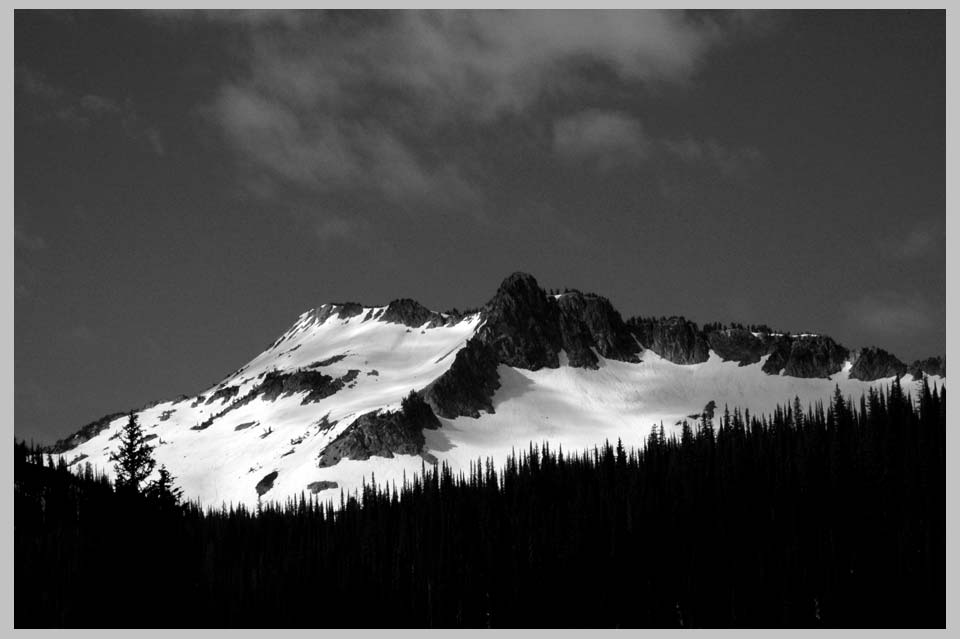
Above Hidden Lake, East Eagle Valley , South Wallowas . . . Notice the
healthy 4th of July snowpack! In an area that receives almost no rain
from June through September, that snow is 'money in the bank.' All
life in these mountains, from trees to nutctrackers—as do ranchers
further down stream—depends on it.
On the road in the American Northwest.
ON THE FRAGMENTATION OF
NATURAL WATER CYCLES
I have to admit, that I do not really know first hand what
a natural water cycle is because I have never lived in a
culture nested wholly within one. But I do without a doubt
know what a natural water cycle is not. And let it be said
straight away, that I do not like what I see, both in the parts
of the European Alps that I know well, and those areas of
the Northwest that I am presently exploring. I do not like
this recurrent pattern of the radical fragmentation of natural
water cycles: the dam the river; break the flow; fill the
reservoir; the incessant watering of questionable monocultures.
And, most importantly, I do not like the, in my view, utterly
futile attempt to control as if it were a neat, orderly, precise
Swiss system of trains, both the rhythm and the quality of
movement of the truly rich and chaotic complexity of the
water cycle as a living whole.
The results stand like a huge warning sign before us
and are unequivocal. For me personally, the evident,
straight forward fact is that, in the Reuss/Rhein watershed
of the Alps where I've worked for many years intensively,
the salmon stopped running in 1958; And now, by some
strange twist of fate, the part of the great Columbia watershed
in which I'm now focusing much of my attention, the South
Wallowas, the salmon also stopped running that same year.
Those are facts. But in a far more subtle and tragic way, some
vast essentially unknowable natural movement has been halted,
has stopped turning as it were, as if a heavy wrench were
thrown into the delicate spokes of a finely trued wheel. So
the movement of the cycle fragments, breaks up into out of
synch, partial, incomplete, disharmonious smaller cycles.
The result is that all life that depends not just on water, but
the flow of a watershed as a whole, begins to suffer—one
species at a time—begins to pull back, dry up, vanish.
("Vanish" here is not an exaggeration: In both areas
mentioned above—the central Alps and the South Wallowas—
there is no recovery plan for salmon, which ipso facto means
that they are effectively being erased from consciousness.)
Nobody intended this to happen. But it is real, and taking
place as we speak. So why do we not let the from the human
perspective infinite wisdom of the Earth itself heal our
mistakes? Why do we not make use of our uniquely human
freedom to stop doing something when we discover it is inherently
contradictory or wrong? Indeed, it may also be argued that
every contradiction against the principles of natural limits
comes together necessarily with the ethical imperative of
taking immediate and decisive action to deal with the
contradiction head on, and thereby restore balance and
harmony. The answer to the why is as simple as it is difficult
to confront and is repeated on every single line of dialogue drawn
in the contemporary sands of environmental contention: on
one side of the line, there exist powerful, vested, moneyed
interests which are totally committed to sustaining the
contradiction to the bitter end. In other words, the natural
world is now unfortunately managed by those who are
primarily concerned not with the flow of water, but with the
flow of cash. But if what I say is true, that we are dealing
here with fundamental contradictions going squarely
against the grain of nature's way, then ultimately, regardless
of what we do, the vast infrastructure built upon these shaky
foundations will sooner rather than later fall apart and
collapse.
Why might this be so? Simply because, in the view represented
here, Nature—as in a telling and remarkable way our own moral
conscience—above all else, abhors contradiction.
 |
|
| back to Picture/Poems: Central Display | go to P/P Photoweek: Archive |or go to last week's PhotoWeek pages |
| Map | TOC: I-IV | TOC: V-VIII | Image Index | Index | Text Only | Download Page | Newsletter | About P/P | About Cliff Crego |
Photograph by Cliff Crego © 2008 picture-poems.com
(created: VIII.3.2008)




